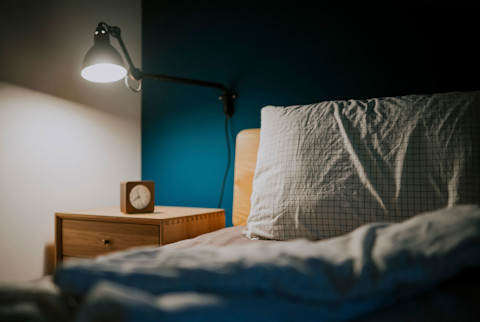How Staring At The Clock Can Make Insomnia Worse, Study Finds

More people than ever have a hard time getting adequate rest, with an estimated 50 to 70 million Americans1 having an issue with either falling or staying asleep. Insomnia, which is characterized by the inability to fall asleep or maintain sleep, is one of the most common sleep disorders.
It's associated with several health conditions, including cardiovascular disease, diabetes, and depression.
Many people with insomnia use prescription sleep aids to fall asleep, but a study conducted by researchers at Indiana University found that sleep-aid users also share another habit that could actually hinder their chances of falling asleep. Here's what they found.
The other behavior that affects sleep quality
Spencer Dawson, Ph.D., lead researcher, clinical assistant professor, and associate director of clinical training at Indiana University's College of Arts and Sciences' Department of Psychological and Brain Sciences, conducted a study including roughly 5,000 patients who received treatment at the university's sleep clinic. All of them used sleep aids to some extent.
The researchers surveyed the participants to collect data about the extent of their insomnia, their sleep medication use, and their own sleep-behavior-observing habits, such as clock-watching. They were also asked about any psychiatric diagnoses they might have. After collecting the data, the researchers used a technique called mediation analysis to determine the connection (if any) between these factors.
Upon doing their analysis, the researchers concluded that those who monitored their behavior relied more on sleep medications and had worse insomnia symptoms than those who didn't. This suggests that watching the clock and wondering why you haven't fallen asleep yet appears to aggravate insomnia, resulting in an even greater use of sleep aids.
"We found time monitoring behavior mainly has an effect on sleep medication use because it exacerbates insomnia symptoms," said Dawson. "People are concerned that they're not getting enough sleep, then they start estimating how long it will take them to fall back asleep and when they have to be up. That is not the sort of activity that's helpful in facilitating the ability to fall asleep—the more stressed out you are, the harder time you're going to have falling asleep."
This study is also particularly helpful because it suggests that a simple behavioral change could help those with insomnia and therefore help stop people from relying on prescription sleep aids for a good night's rest. "One thing that people could do would be to turn around or cover up their clock, ditch the smartwatch, and get the phone away so they're simply not checking the time," explained Dawson. "There's not any place where watching the clock is particularly helpful."
Ways to help sleep better more naturally
If you're looking to stop using prescription sleep aids to fall asleep (with the permission of your doctor), try incorporating some of these natural methods instead—all of which can benefit sleep if used correctly. Considering some of the proven options below and ditching those screens and clocks may have greater effects on your sleep than you might think.
Try a natural sleep supplement: Many ingredients in sleep supplements have been shown to help induce sleep in clinical research, such as magnesium bisglycinate2, gamma-aminobutyric acid (GABA)3, and L-theanine4. Check out our favorite natural sleep supplements here.
Turn off all screens at least an hour before bed. Studies have shown that the use of screens and other light-emitting devices can severely affect your sleep and induce more alertness5, making it much harder to get some shut-eye. Therefore, it's suggested to avoid screens for at least an hour before bed (ideally two), to get the best sleep possible.
Avoid caffeine for a minimum of eight hours before bed. We all know that the first cup of coffee in the morning can help keep us alert and ready for the day, but caffeine can actually stay in your system for hours. Therefore, if you have trouble falling asleep, it's recommended that you cut out caffeine for at least eight hours before bed so that it doesn't interfere with your sleep.
Consider chamomile tea. Research has shown that ingesting chamomile extract can significantly improve sleep quality6, so adding chamomile tea as a nightcap to your evening routine may offer some benefits.
The takeaway
A study found a connection between monitoring your behavior when falling asleep and insomnia—doing so results in an increased reliance on sleep medications. This suggests that making a simple behavioral change can help decrease insomnia symptoms, thus potentially helping reduce the use of prescription medications for sleep.
There are also plenty of other easy ways to help promote sleep, such as taking a natural sleep supplement or avoiding screens as part of your nighttime routine.
